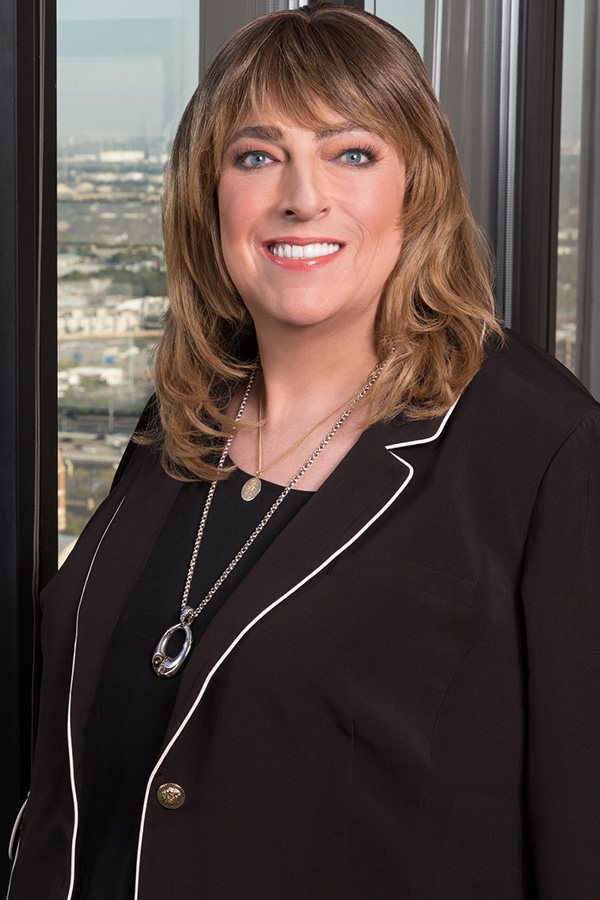Danielle Healey, a member of the National LGBT Bar Association and the LGBT Bar’s Justice Council, who has been practicing law for over 30 years, is a Senior Principal at Fish & Richardson P.C. She specializes in mediation, patent and IP licensing and litigation and is also an arbitrator. She was recently named one of 2018’s “Women Who Mean Business,” and is nationally ranked by Chambers, as at the top of the U.S. patent litigation bar.
While the majority of her work has been in licensing and litigation of patent and trade secret issues, these practices show only one side of her passion for the law. “My current situation is bifurcated. Patent, IP, and antitrust are commercial issues on a high intellectual level and typically do not involve people’s day to day lives”,” she says. Her pro bono work in immigration and LGBTQ+ rights, on the other hand, is much more personal. “My activism is typically representing a person, or a group of people, and that’s much more human. It’s the kind of thing where people’s lives can be at real risk,” she states.
Danielle devotes a substantial amount of time to her pro bono practice, which includes representing LGBTQ+ individuals seeking asylum in the United States. “I represent gay and transgender people in immigration proceedings,” she says. When she first got involved, the gravity of the work shocked her. “I didn’t realize until I started doing the cases how horrible it was in many parts of the world for LGBTQ+ people. I didn’t realize gay people could be imprisoned in Nigeria, or that being a trans woman in Honduras is basically looking at a death sentence,” she says. “It’s an awesome responsibility to fight for another human being’s life.”
In addition to representing asylum seekers, Danielle has also worked with activist groups to advocate for LGBTQ+ equality. In 2017, Danielle partnered with the National LGBT Bar Association to file an amicus brief in the Texas Supreme Court case Pidgeon v. Turner arguing that same-sex couples are entitled to the same legal rights and benefits as different-sex couples. “It’s very personal when the state where I live is actively working to rollback rights for LGBTQ+ people,” she says, but “the National LGBT Bar was ready to jump in and wave the flag when a lot of other people didn’t want to.”
2017 was also the year that Danielle came out as transgender. She says she got a lot of support from the legal community, especially at her firm. “Fish has done a really good job of supporting me and helping me. I’ve been grateful but it’s still a learning process for all of us,” she says.
For Danielle, the LGBT Bar has also been a helpful resource in finding support and spreading awareness of the challenges that trans lawyers face. “It introduced me to people who were willing to help.” Last year, Danielle presented on a panel at the LGBT Bar’s Annual Lavender Law Conference® and Career Fair on transgender lawyers practicing post transition. “It helped me spread the word to other people that there’s nothing stealth about being a trans lawyer when you transition at 45, 50, and beyond. That is different from what a lot of other LGBTQ+ lawyers confront,” she says.
Danielle says that membership with the LGBT Bar is particularly helpful to her because in Houston, where she currently lives, it is difficult to find a supportive community. “If you’re an LGBTQ+ lawyer in Texas [the LGBT Bar] is really the only place that you’re going to find active support. There are some resources here, but not many.” In particular, she says that the LGBT Bar’s Lavender Law Conference® is a good way to make meaningful connections. “Lavender Law® is a wonderful place to get together with other LGBTQ+ lawyers,” she says.
In addition to providing a strong sense of community, Danielle values her membership with the LGBT Bar as a way to stay up to date on legal developments and support activism for LGBTQ+ rights. “We need to have a forum where people can share information, be aware, and where the LGBT Bar can advocate on serious issues like eliminating conversion therapy and the gay panic defense,” she explains. “Those are serious issues. How are we going to succeed in eliminating more subtle forms of discrimination if we don’t have anyone fighting for more serious issues?”
Danielle says that it is necessary now more than ever that the LGBTQ+ community stand up to injustice. “There is a tide of anti-LGBTQ+ laws that people really need to pay attention to and rally against,” she says. The LGBT Bar is a crucial way for her to stay active in the fight for equality.
“We need all of us, as a community, and as a Bar, to advocate for ourselves and for others,” she says. “We still have a lot to do.”

